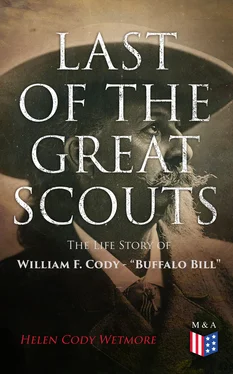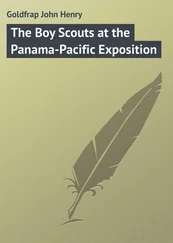The result of mother's study of the situation was, "If I had the ready money, I should fight the claim."
"You fight the claim, and I'll get the money," Will replied.
Mother smiled, but Will continued:
"Russell, Majors & Waddell will give me work. Jim Willis says I am capable of filling the position of 'extra.' If you'll go with me and ask Mr. Majors for a job, I'm sure he'll give me one."
Russell, Majors & Waddell were overland freighters and contractors, with headquarters at Leavenworth. To Will's suggestion mother entered a demurrer, but finally yielded before his insistence. Mr. Majors had known father, and was more than willing to aid us, but Will's youth was an objection not lightly overridden.
"What can a boy of your age do?" he asked, kindly.
"I can ride, shoot, and herd cattle," said Will; "but I'd rather be an 'extra' on one of your trains.'
"But that is a man's work, and is dangerous besides." Mr. Majors hesitated. "But I'll let you try it one trip, and if you do a man's work, I'll give you a man's pay."
So Will's name was put on the company roll, and he signed a pledge that illustrates better than a description the character and disposition of Mr. Majors.
"I, William F. Cody," it read, "do hereby solemnly swear, before the great and living God, that during my engagement with, and while I am in the employ of, Russell, Majors & Waddell, I will, under no circumstances, use profane language, that I will not quarrel or fight with any other employee of the firm, and that in every respect I will conduct myself honestly, be faithful to my duties, and so direct all my acts as to win the confidence of my employers. So help me God!"
Mr. Majors employed many wild and reckless men, but the language of the pledge penetrated to the better nature of them all. They endeavored, with varying success, to live up to its conditions, although most of them held that driving a bull-team constituted extenuating circumstances for an occasional expletive.
The pledge lightened mother's heart; she knew that Will would keep his word; she felt, too, that a man that required such a pledge of his employees was worthy of their confidence and esteem.
The train was to start in a day, and all of us were busy with the preparations for Will's two months' trip. The moment of parting came, and it was a trying ordeal for mother, so recently bereaved of husband. Will sought to soothe her, but the younger sisters had better success, for with tears in our eyes we crowded about him, imploring him to "run if he saw any Indians."
'Tis but a step from tears to smiles; the situation was relieved, and Will launched his life bark amid adieus of hope and confidence and love. His fortitude lasted only till he was out of sight of the house; but youth is elastic, the plains lay before him, and mother and sisters were to be helped; so he presented a cheerful face to his employers.
That night the bed of the "boy extra" was a blanket under a wagon; but he slept soundly, and was ready when the train started with the dawn.
The "bull-train" took its name from the fact that each of the thirty-five wagons making up a full train was hauled by several yoke of oxen, driven by one man, known as a bullwhacker. This functionary's whip cracked like a rifle, and could be heard about as far. The wagons resembled the ordinary prairie-schooner, but were larger and more strongly built; they were protected from the weather by a double covering of heavy canvas, and had a freight capacity of seven thousand pounds.
Besides the bullwhackers there were cavallard drivers (who cared for the loose cattle), night herders, and sundry extra hands, all under the charge of a chief wagon-master, termed the wagon-boss, his lieutenants being the boss of the cattle train and the assistant wagon-master. The men were disposed in messes, each providing its own wood and water, doing its own cooking, and washing up its own tin dinner service, while one man in each division stood guard. Special duties were assigned to the "extras," and Will's was to ride up and down the train delivering orders. This suited his fancy to a dot, for the oxen were snail-gaited, and to plod at their heels was dull work. Kipling tells us it is quite impossible to "hustle the East"; it were as easy, as Will discovered, to hustle a bull-train.
From the outset the "boy extra" was a favorite with the men. They liked his pluck in undertaking such work, and when it was seen that he took pride in executing orders promptly, he became a favorite with the bosses as well. In part his work was play to him; he welcomed an order as a break in the monotony of the daily march, and hailed the opportunity of a gallop on a good horse.
The world of Will's fancy was bounded by the hazy rim where plain and sky converge, and when the first day's journey was done, and he had staked out and cared for his horse, he watched with fascinated eyes the strange and striking picture limned against the black hills and the sweeping stretch of darkening prairie. Everything was animation; the bullwhackers unhitching and disposing of their teams, the herders staking out the cattle, and—not the least interesting—the mess cooks preparing the evening meal at the crackling camp-fires, with the huge, canvas-covered wagons encircling them like ghostly sentinels; the ponies and oxen blinking stupidly as the flames stampeded the shadows in which they were enveloped; and more weird than all, the buckskin-clad bullwhackers, squatted around the fire, their beards glowing red in its light, their faces drawn in strange black and yellow lines, while the spiked grasses shot tall and sword-like over them.
It was wonderful—that first night of the "boy extra."
But Will discovered that life on the plains is not all a supper under the stars when the sparks fly upward; it has its hardships and privations. There were days, as the wagons dragged their slow lengths along, when the clouds obscured the sky and the wind whistled dismally; days when torrents fell and swelled the streams that must be crossed, and when the mud lay ankle-deep; days when the cattle stampeded, and the round-up meant long, extra hours of heavy work; and, hardest but most needed work of all, the eternal vigil 'gainst an Indian attack.
Will did not share the anxiety of his companions. To him a brush with Indians would prove that boyhood's dreams sometimes come true, and in imagination he anticipated the glory of a first encounter with the "noble red man," after the fashion of the heroes in the hair-lifting Western tales he had read. He was soon to learn, as many another has learned, that the Indian of real Life is vastly different from the Indian of fiction. He refuses to "bite the dust" at sight of a paleface, and a dozen of them have been known to hold their own against as many white men.
Some twenty miles west of Fort Kearny a halt was made for dinner at the bank of a creek that emptied into the Platte River. No signs of Indians had been observed, and there was no thought of special danger. Nevertheless, three men were constantly on guard. Many of the trainmen were asleep under the wagons while waiting dinner, and Will was watching the maneuvers of the cook in his mess. Suddenly a score of shots rang out from the direction of a neighboring thicket, succeeded by a chorus of savage yells.
Will saw the three men on the lookout drop in their tracks, and saw the Indians divide, one wing stampeding the cattle, the other charging down upon the camp.
The trainmen were old frontiersmen, and although taken wholly by surprise, they lined up swiftly in battle array behind the wagons, with the bosses, Bill and Frank McCarthy, at their head, and the "boy extra" under the direction of the wagon-master.
A well-placed volley of rifle-balls checked the Indians, and they wheeled and rode away, after sending in a scattering cloud of arrows, which wounded several of the trainmen. The decision of a hasty council of war was, that a defensive stand would be useless, as the Indians outnumbered the whites ten to one, and red reinforcements were constantly coming up, until it seemed to Will as if the prairie were alive with them. The only hope of safety lay in the shelter of the creek's high bank, so a run was made for it. The Indians charged again, with the usual accompaniment of whoops, yells, and flying arrows; but the trainmen had reached the creek, and from behind its natural breastwork maintained a rifle fire that drove the foe back out of range.
Читать дальше












